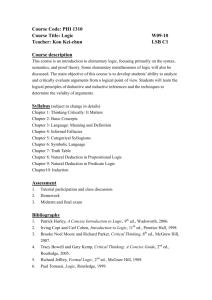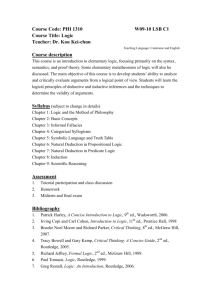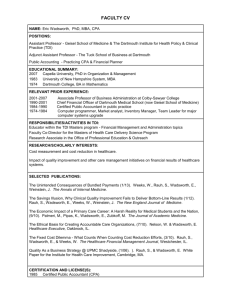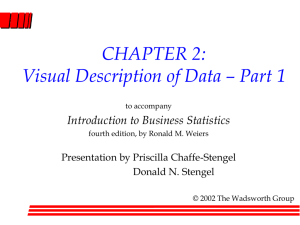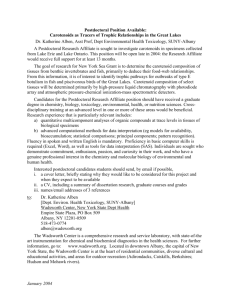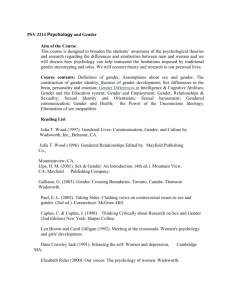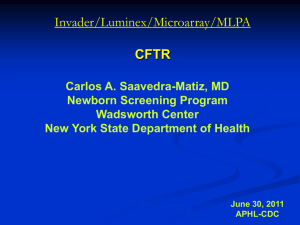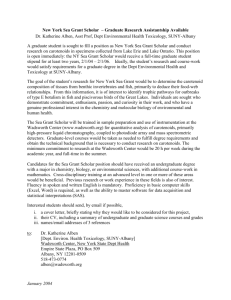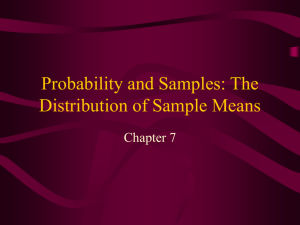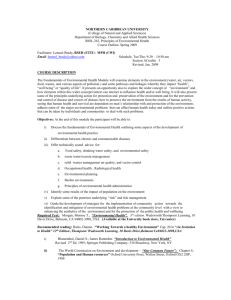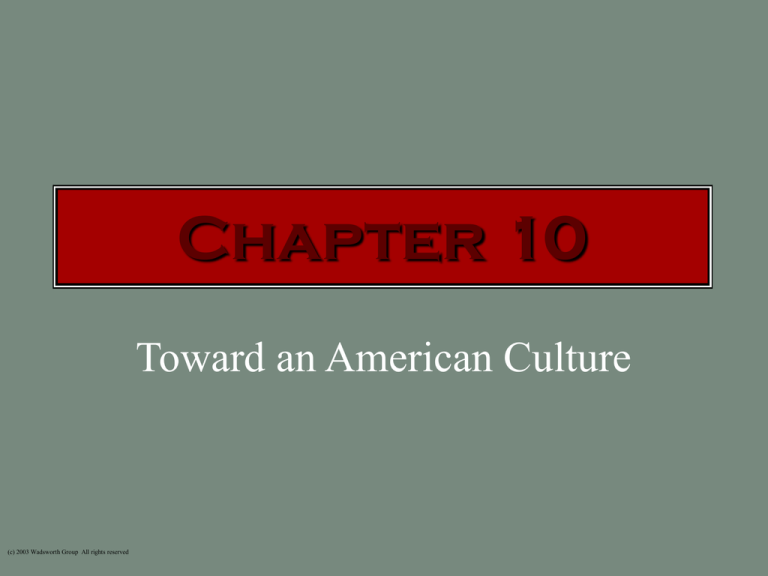
Chapter 10
Toward an American Culture
(c) 2003 Wadsworth Group All rights reserved
The Northern Middle Class
• “Most valuable class in any community is the
middle class”—Walt Whitman
• New kinds of proprietors made in the market
revolution
– City and county merchants
– Master craftsmen, manufacturers
– Market-oriented farmers
• Many were New Englanders
• Yankee Protestantism: the foundation of American
middle-class culture
(c) 2003 Wadsworth Group All rights reserved
The Evangelical Base
• Charles Grandison Finney
– Rochester, New York
– New Evangelicalism
(c) 2003 Wadsworth Group All rights reserved
Domesticity
• Distinctions made between the home and
the world
• Spheres for men and women:
– Men: politics and economics
– Women: moral influence in households:
• A feminization of domestic life
• Fewer children, more attention to each
– Morals reflected in Sunday schools
(c) 2003 Wadsworth Group All rights reserved
Sentimentality
• Godey’s Lady’s Book
– Sarah Josepha Hale
• Nathaniel Hawthorne, “damned mob of scribbling
women”
– Susan Warner, The Wide, Wide World
– Maria Cummin, The Lamplighter
• Women writers de facto Evangelical ministers
• Harriet Beecher Stowe
– Uncle Tom’s Cabin
(c) 2003 Wadsworth Group All rights reserved
Fine Arts
• 1820s and 1830s: literature and the arts are
viewed more favorably than in previous
post-revolutionary era
• Relations between nature and civilization
(c) 2003 Wadsworth Group All rights reserved
Nature and Art
• Art as avenue to grand lessons of nature
• Mt. Auburn Cemetery
• Thomas Cole
– “Essay on American Scenery”
• Ralph Waldo Emerson
• Henry David Thoreau
(c) 2003 Wadsworth Group All rights reserved
Scenic Tourism:
Niagara Falls
• Wealthy Americans began to travel for the
purpose of looking at scenery
• Niagara Falls
– Erie Canal
(c) 2003 Wadsworth Group All rights reserved
The Plain People of the North
• Settlers in the lower Northwest remained
culturally southern
• Hill-country New Englanders, New Yorkers, and
Pennsylvanians
• Refugees from countryside working as urban
laborers
• Irish and German immigrants
• All often rejected sentimentalism and reformist
religion
(c) 2003 Wadsworth Group All rights reserved
Religion and Common Folk
• Huge diversity in churches, faiths
• Evangelical emphasis on individual experience
over churchly authority
• Providence
– God has blueprint
– Death of loved one God’s test
(c) 2003 Wadsworth Group All rights reserved
Popular Millennialism
• postmillennialists
• premillennialism
• William Miller
– Millerites
– Seventh Day Adventist Church
(c) 2003 Wadsworth Group All rights reserved
Family and Society
• Baptists, Methodists and smaller sects
evangelized among those left behind by
market revolution: dependent, wage-earners
• Middle-class saw progress, while poorer
and more conservative evangelicals saw a
descent into worldliness
• Critical of Market Revolution assault on
traditional patriarchy
(c) 2003 Wadsworth Group All rights reserved
The Prophet Joseph Smith
• Reaction against weakening of traditional
patriarchy
• The Book of Mormon
– Church of Jesus Christ of Latter-Day Saints
(c) 2003 Wadsworth Group All rights reserved
The Rise of Popular Culture
• Plain folk: producers and consumers
of nonreligious commercial popular
culture
(c) 2003 Wadsworth Group All rights reserved
Blood Sports
• Urban working-class neighborhoods
• Bachelor sub-culture formed
– Departure from piety and self-restraint of the
middle-class
– Volunteer fire companies and militia units or
drinking gangs
• Sportsman Hall, New York City
– Cock fights, ratting, dog fighting
(c) 2003 Wadsworth Group All rights reserved
Boxing
• Irish and English immigrants
• Ethnic-based street gangs:
– Dead Rabbits
– Bowery B’hoys
• Role of butchers
(c) 2003 Wadsworth Group All rights reserved
An American Theater
• Theater and theater companies spread to interior
• Theater riots
• Theaters separate to appeal to rival audiences
– Edwin Forrest vs. William Charles Macready
– Astor Place Riot (1849)
• Playhouses for working class
(c) 2003 Wadsworth Group All rights reserved
Minstrelsy
• Most popular form of theater: blackface minstrel
shows: 1840-1880
–
–
–
–
1st Minstrel show Thomas Rice “jumps Jim Crow” 1831
Mostly attended by men
Performed by white men who wore “blackface”
Toned down, Europeanized African American song and
dance
– Reinforced racial stereotypes
– Content of shows dealt with social and political life
• Traveling Minstrel shows
– Grecian Dog Apollo
(c) 2003 Wadsworth Group All rights reserved
Novels and the Penny Press
• Penny newspapers and dime novels
• Philadelphia Gazette and sensationalism
• “yellow back novels”
– Quaker City (1845)
• Working class popular culture
– Melodramatic contest between good and evil
– World is evil
– E.Z.C. Judson (Ned Buntline)
(c) 2003 Wadsworth Group All rights reserved
Family, Church, and
Neighborhood: The White South
• Southerners remained localistic and
culturally conservative
• Prospects for most Southern whites:
inherited land and family
• Southerners were grounded in authority of
patriarchs and integrity of families
(c) 2003 Wadsworth Group All rights reserved
Southern Families
• Family members: representatives of families,
rather than individuals – duty to their family
• Reputation and defense of the family name
and honor
• Family honor more important than wealth
• Southern code of honor
• Honor the obligations to which one is born
(c) 2003 Wadsworth Group All rights reserved
Southern Entertainments
• Rural character of South meant fewer commercial
entertainments
• English literature preferred
– Sir Walter Scott and Chivalry
• Hunting and fishing
• Commercial entertainment
– Showboats along river towns
– Horse racing
– New Orleans
(c) 2003 Wadsworth Group All rights reserved
The Camp Meeting
Becomes Respectable
• Evangelical “Bible Belt”
• Revivals continue
• Reinforced localistic neighborhoods and
patriarchal families
(c) 2003 Wadsworth Group All rights reserved
Religious Conservatism
• Misfortune is divine punishment
• Southern cultural conservatism was rooted
in:
– Religion
– The family
– A system of fixed family roles
(c) 2003 Wadsworth Group All rights reserved
Proslavery Christianity
• By 1830 South was minority in a democratic and
capitalist nation
• Northern middle-class: made a connection
between material and moral progress
– Individual autonomy and universal rights
• Radical northern minority advocated abolition of
slavery
• Southern response: moral and religious defense of
slavery
– Rejects Jefferson’s “self-evident” equality of man
(c) 2003 Wadsworth Group All rights reserved
The Private Lives of Slaves
• Plantation slaveholders knew their success
depended on slaves’ labor and obedience
in exchange for allowing slaves some
privilege and autonomy
(c) 2003 Wadsworth Group All rights reserved
The Slave Family
• Most precious slave privilege: right to make and
maintain families
• Slave marriages
• Slave families vulnerable
– Slaves used for sex by owners
– Slaves were assets that were sometimes liquidated
• Slaves modified their relations in anticipation of
uncertainties
• Extended kinship
(c) 2003 Wadsworth Group All rights reserved
White Missions
• Missions to slaves
– Owners responsible for spiritual welfare of
slaves
• Charles Colcock Jones
(c) 2003 Wadsworth Group All rights reserved
Slave Christians
• Slaves ignored much of missionary
teachings
• Slaves embraced Christianity:
– transformed it into an independent African
American faith
• Incorporated social and ritual practices
passed down from West Africa
• Moses not Abraham at Jesus’s side
(c) 2003 Wadsworth Group All rights reserved
Religion and Revolt
• Slave revolt rare
• Running away common form of rebellion
• Christianity convinced slaves that justice would
come to them
• Denmark Vesey
– Vesey plot (1822)
– Gullah Jack
(c) 2003 Wadsworth Group All rights reserved
Nat Turner
• Nat Turner’s Rebellion (1831)
– Instrument of God’s wrath
• Virginia: 60 slaves killed 55 whites
• Deeply troubling for Southern whites
(c) 2003 Wadsworth Group All rights reserved
Conclusion
• America’s patchwork of regional, class, and
ethnic cultures:
–
–
–
–
New middle-classes of North and West
Poor urban dwellers
Evangelical, socially conservative Southerners
Slave culture
(c) 2003 Wadsworth Group All rights reserved

